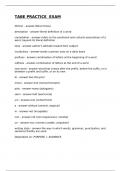TABE PRACTICE EXAM
Diction - answer-Word Choice
denotation - answer-literal definition of a word
connotation - answer-refers to the emotional and cultural associations of a word, beyond its literal definition
tone - answer-author's attitude toward their subject
vocabulary - answer-words a person uses on a daily basis
prefixes - answer-combination of letters at the beginning of a word
suffixes - answer-combination of letters at the end of a word
root word - answer-word that comes after the prefix, before the suffix, or in between a prefix and suffix, or on its own
bi - answer-two (bicycle)
mono - answer-one (monochromatic)
poly - answer-many (polygamy)
semi - answer-half (semicircle)
uni - answer-one (united front)
a - answer-without (amoral, atypical)
in - answer-not (incapable)
non - answer-not (non-responsive), nonstop
un - answer-not, reverse (unable, unspoken)
writing style - answer-the way in which words, grammar, punctuation, and sentence fluidity are used Dependent on: PURPOSE + AUDIENCE Sentence Fluidity - answer-whether sentences are long and rhythmic or short
and succinct
Main Idea - answer-What the author wants to communicate about the topic at hand Usually: conveyed in a thesis statement at the beginning of the work
Primary Purpose - answer-Why the author is writing in the first place
Rhetorical Appeal - answer-ethos, pathos, logos
Ethos - answer-appeal to the audience's ethics and morals
Pathos - answer-appeal to the audience's emotions and sympathies
Logos - answer-appeal to the audience's logic and reasoning
Writing Mode - answer-persuasive, informative, argumentative
Main Idea - answer-central topic or theme
Supporting Details - answer-used in the body paragraphs to support/justify/clarify/ and back up the main idea
General Order (Transition Words) - answer-signaling an elaboration of an idea to emphasize a point --- for example, furthermore, for instance, to demontrate, including, such as, in other words, that is, in fact, also, likewise, and, truly, so, surely
Chronological Order - answer-referencing the time frame in which the main event or idea occurs --- before, after, first, while, soon , shortly, thereafter, awhile, meanwhile
Numerical order/importance - answer-inidicating that related ideas/details, will be described in sequence, possibly due to importance --- first, second, third, finally
Spatial order - answer-referring to space and location of something or where things are located --- above, below, beside, around, within, close
Cause and Effect Order - answer-signaling a causal relationship between events or ideas -- thus, therefore, since, because, as a result, consequently, hence, for, so Compare and contrast order - answer-identifying the similarities and differences between two or more objects, ideas, or lines of thought --- like, as, similarliy, equally, just as, likewise
Summary Order - answer-indicating that a particular idea is coming to a close --- in conclusion, to sum, ultimately, above all
Fact - answer-can be backed up/proven true
Opinion - answer-personal view/information open to debate (morals, politics, religion, rights)
Logical fallacy - answer-a flaw in logic used to make the argument
Slippery Slop - answer-a fallacy built on the idea that a particular action will lead to a series of events with negative results
Red Herring - answer-The use of an observation or distraction to remove attention from the actual issue
Straw Man - answer-An exaggeration or misrepresentation of an argument so
that is easier to refute
Post Hoc Ergo Propter Hoc - answer-a fallacy that assumes an event to be the consequence of an earlier event merely because it came after it
Bandwagon - answer-a fallacy that assumes because the majority of people feel/believe a certain way that it must be right
Ad Hominem - answer-the use of a personal attack on the person or persons associated with a certain argument rather than focusing on the actual argument itself
Literal word choice - answer-the usual or intended way a word is used/phrased
Figurative language - answer-language that is typically found in fiction and poetry
Inference - answer-reader's ability to understand the unwrittent text "read between the lines"
Deduction - answer-deriving conclusions from ideas assumed to be true
Informational Texts - answer-category of texts within the genre of nonfiction;
their intent is to inform




